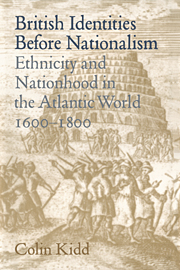Book contents
- Frontmatter
- Contents
- Acknowledgements
- Note
- List of abbreviations
- 1 Introduction
- Part I Theological contexts
- Part II The three kingdoms
- 4 Whose ancient constitution? Ethnicity and the English past, 1600–1800
- 5 Britons, Saxons and the Anglican quest for legitimacy
- 6 The Gaelic dilemma in early modern Scottish political culture
- 7 The weave of Irish identities, 1600–1790
- Part III Points of contact
- Index
5 - Britons, Saxons and the Anglican quest for legitimacy
Published online by Cambridge University Press: 06 July 2009
- Frontmatter
- Contents
- Acknowledgements
- Note
- List of abbreviations
- 1 Introduction
- Part I Theological contexts
- Part II The three kingdoms
- 4 Whose ancient constitution? Ethnicity and the English past, 1600–1800
- 5 Britons, Saxons and the Anglican quest for legitimacy
- 6 The Gaelic dilemma in early modern Scottish political culture
- 7 The weave of Irish identities, 1600–1790
- Part III Points of contact
- Index
Summary
The ecclesiastical past was a foreign country: antiquarians conducted their arguments very differently there. Anglo-Saxon precedents in the religious sphere were easily trumped by appeals to the primitive, apostolic era of British Christianity. During the same period when English political identity was becoming predominantly Saxonist, and the legend of the parliamentary and legal institutions of the Britons was shunted to the margins of English political discourse, the ethnic associations of the Church of England remained firmly tied to a myth of ancient British Christianity. Indeed, despite the rise of Gothicism, the significance of the ancient British era for Anglicans would not dim until the late eighteenth century.
For most of the seventeenth and eighteenth centuries the standard Anglican interpretation of English history ran – broadly speaking – as follows. The Church of England was an apostolic foundation, though antiquaries debated the rival merits of the various ‘plausible’ contenders: Simon Zelotes, Philip the Apostle, James son of Zebedee, the quasi-apostolic Joseph of Arimathea, Aristobulus, Paul, some other follower of Our Lord – though definitely not St Peter. Anglican scholars did not conjure such ecclesiological fantasies out of nothing. To cite only the two most compelling authorities: Tertullian in his Adversus Judaeos (c. AD 208) claimed that the gospel had already penetrated those areas of Britain inaccessible to Roman arms, and there appeared to be a reference in Gildas to a conversion of the Britons in the reign of the emperor Tiberius.
- Type
- Chapter
- Information
- British Identities before NationalismEthnicity and Nationhood in the Atlantic World, 1600–1800, pp. 99 - 122Publisher: Cambridge University PressPrint publication year: 1999
- 1
- Cited by



